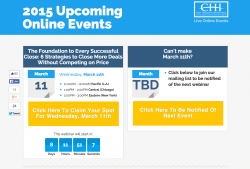 There are over ONE BILLION websites currently active online. That means you are competing with ONE BILLION other sites for visitors attention. And to make it more difficult, even if you finally get them to visit,
There are over ONE BILLION websites currently active online. That means you are competing with ONE BILLION other sites for visitors attention. And to make it more difficult, even if you finally get them to visit,
55% of visitors spend fewer than 15 seconds on your website. (Hubspot 2014).
That means for all the money you spend to host it, maintain it, market it, pay for ads to advertise it… More than HALF leave without a chance to read even one whole sentence. So the QUESTION is… How are you going to GRAB the attention of your potential buyers, and KEEP them longer than 15 seconds?
The answer: focus on THEM, not on YOU. Most businesses talk about themselves. Their products. Their services. Who THEY are. If visitors are leaving your site in 15 seconds, the only way you’re going to grab them is talking about their pains, their needs, and their desires. This concept is the KEY to building a website that will unseat your competition.
STOP SELLING, START EDUCATING.
Take this example, if you went to a coaching company’s website and the page started by saying:
“Our coaching team is made of professional, executive coaches that focus on generating results for clients. Our coaches are highly trained, often running successful businesses of their own, have experience and have proven themselves to be the best at creating a context for results.
If you want to learn more, schedule a free talk here.”
How interested are you? Has anything caught your eye? Would you stop to read more? Did you even read the few sentences that were there or did you already skip over it?
Now what if you saw this instead:
Why is Coaching Important?
Michael Phelps is arguably the greatest Olympians to ever live. He has 22 Olympic medals, 18 of them GOLD. In fact, he has DOUBLE the number of gold medals than his closest competitors.
So WHY does someone who has mastered his trade ranking in the top .001% in the WORLD, have 3 coaches to help him? Why? Because top performance requires a strategic edge, and his own eyes can’t provide the perspective of an outsider. That’s why 75% of Fortune 500 CEOs have an outside expert to guide them in their businesses.
So What are the 4 Things that a Coach Does for You?
- ACCOUNTABILITY: Having someone hold your feet to the fire to make sure you’re executing, progressing, and meeting your goals. Do you do a good job already? Wait until you experience the progress achievable with a true master at your side.
- EXPERTISE:Knowing that someone else has already had success in what you’re trying to accomplish, of course it’s going to be an easier process if you have someone with experience to guide you.
- GIVES FEEDBACK:A true coach doesn’t tell you what you want to hear. A coach is there to tell you what you NEED to hear, to improve. Period.
- SEE THE BLIND SPOTS:As long as you are working in your business, there will ALWAYS be blind spots –things you don’t know that you don’t know. You need an outside observer who has been there before to look over your shoulder and bring your attention to what you DON’T see.
Want someone to revolutionize your world? Metrix Global concluded that executive coaching typically has an ROI of 500-700%. We employ and train the World’s BEST business coaches to:
- Keep you and your organization working ON your business, not just IN it
- Dramatically increase your marketing results to create massive new opportunities
- Develop your businesses Core Story™ to stop just selling and start solving your prospects needs
- Create a Superstar sales team, processes and tools to ignite revenue growth
- Achieve massive results in any business impact area you can think of!
Schedule a No Obligation Consultation TODAY
What’s different about this example from the previous one?
- It’s engaging from the beginning.
- It educates the buyer on why they would want coaching even if they didn’t know they needed it in the first place.
- It adds credibility by referencing third party data.
We switch this conversation for business owners CONSTANTLY. We incorporate this principle into webinars, websites, and sales scripts. Talk about your buyer, not you. Education based marketing is an unbelievably powerful tool at it’s finest and your website is a great place to start wielding it!
MORE EXAMPLES
Here are some business owners and clients who have incorporated this key technique:
- http://www.earthkind.com/ -Click on the Learning Center to see Kari’s education portion, have you ever seen a rodent repellant company be so thorough in their education? This is one of the techniques they used to go from $800,000 to $2.4 million in 8 months. That’s TRIPLE her revenue in less than a year! Educating the major distributors in the market made her Dream 100 strategy highly successful in a very short amount of time.
- http://medicaloptics.ie/ -Look at the links to the left, a wonderful array of Free reports that add VALUE unlike any other Optician. Doug said his sales increased last year by 20% which is a much better growth than the Irish economy which was only 3.4%. He credits his new online ad campaign using his free reports to provide value for his visitors, entice them to come to his site, and read further, instead of talking solely about his business’ product and services. No other Opticians are this advanced in their marketing efforts.
- http://sorensenwealth.com/ Sorenson is a great example of someone who has really mastered this distinction. GREAT education. Financial planners do not normally provide this kind of value. Because of that he has a competitive edge above his competition and truly sees results from his website.
FURTHER EDUCATION
If you’re the type of business owner that likes to take the fast track and have an expert guide you, contact us to see where we can assist you to master this distinction and increase your sales. If you want to read more about education based marketing, and the power of a Core Story, you can purchase our New York Times Best Seller “The Ultimate Sales Machine.” Or download some more of our free education in our Training and Tools tab on our website.
]]>
Which has a better burger, your local burger spot or McDonald’s?
If it was just about the product or service, your favorite hamburger joint would be a mega franchise and McDonald’s would have stayed as one location. But we all know that the world doesn’t work that way, and Joe’s Burgers won’t be competing with McDonald’s any time soon. My father, Chet Holmes, taught that having a successful business is not solely based on your product or service, it’s about the 12 key areas you need to master for growth.
My mastery training in the Chet Holmes Method started with Chet Holmes as a Dad. I remember my first lemonade stand. It wasn’t just a sign saying “Lemonade.” It was a sign saying, “The Best Lemonade You’ve Ever Had.” I remember asking my father why it would be the best ever, and all he said was, “Trust me.” He was right. The amount of people who stopped to get my lemonade quadrupled. They stopped because they were either:
A. hot and thirsty (they probably would have stopped regardless)
B. impressed that a nine-year-old had the gumption to sell “The Best Lemonade Ever” on the side of the road.
There were instances in my life where learning from my father resulted in unusual success. Within the music industry there are many similarities between artists and CEOs of companies. As a previous singer songwriter, I traveled from gig to gig playing my songs everywhere and anywhere I could (Pig Headed Discipline™). Sometimes I worked just for tips and CD sales. Many artists frowned on working for tips, but there was a point where I knew that at every gig I played, I would close 90% of the room to buy my CD. I was the only artist in my network that actually made significant money that way. Of course, we are all aware that the life of an artist is a difficult one, rarely filled with financial rewards, but you might be surprised to hear that it’s not too different in the business world. A recent survey by The Federal Reserve Bank of New York found that 66% of firms operate at a loss. (Small business credit survey, The Federal Reserve Bank of New York)
So why did I see monetary success unlike many of my fellow musicians? And how does it relate to your business? Let me explain.
I used to tour with a girl that was a far greater musician than me. She played the piano like an angel from heaven. Her songs were clever and catchy. We went from gig to gig together, and when we first started out, she would get up on stage and her set was just song after song after song. Her songs were beautiful, but they didn’t result in many tips. Then I would get up on stage. I couldn’t help myself. A lifetime of Chet Holmes’s personal instruction came out. The first thing I would do was get the names of random people in the crowd. I would learn as many names as possible, and then the rest of my set would be a full dialogue back and forth with the audience— a.k.a. my potential buyers. Then, not only would I build rapport with the people, I would introduce everyone to the one and only – my tip jar. I would actively talk about my love affair with the tip jar throughout the entire set. In the end, they bought my CD. AND they left a tip.
Now I look back trying to understand what I did that naturally brought me success, and I realize that so much wasn’t my product or service, it was the creativity of my delivery, the rapport with the prospect, and my sheer Pig Headed Discipline to get the sale. We know that 80% of sales come after the 5th or 12th contact. How are you implementing this in your business? What are you doing to keep your buyer entertained through all those contacts?
For me, within a 2 hour set I asked for tips in between every song. Sometimes I randomly sang a lyric about my tip jar in the midst of a song. I would crack joke after joke about the tip jar. It all became part of the act. In the hundreds of shows, only one person come to me and say it was obnoxious how much I talked about my tip jar. Otherwise, thousands more laugh along entertained by my charming persistence. Sometimes I would even add extra incentives for filling my tip jar. If they filled the jar to the top, I would walk on my hands. (If you can get salespeople that will walk on their hands, that’s an added bonus.)
Doing shows with this other singer made it obvious just how superior my sales methods were. I knew that people liked her music more, but she had little to no rapport with the audience, and so it was harder for her to make money at the end of her set. She thought that HAVING a tip jar was enough of a reminder and that the audience would know when they wanted to buy. Whereas I MADE SURE they didn’t leave the premise until they’d taken a CD home with them to memorialize this profound experience they just had with us that day. I made sure that everyone was involved, and they truly got something out of the experience. Because of my entertainment, I was closing everyone in the room on my album AND hers. Don’t get me wrong, we had to have the talent to back up the sales or nobody was going to buy our albums, but it was the years of training, ingrained in me by my father, which got the crowd to buy. It wasn’t just the music.
I tell you this story today to remind you to keep practicing thinking strategically. Come up with more ways to build rapport, increase the level of satisfaction of your buyer, create up-sells that serve your client. What can you do to creatively invite them to pull out their pocketbook and buy? Because often times the reason they buy has nothing to do with the product itself. Mastery isn’t about doing 4,000 things. It’s about doing twelve things 4,000 times. Joe’s Hamburgers has mastered the twelve ways to make a delicious hamburger, but those aren’t the twelve areas of mastery Joe needs to make his company outrageously profitable. Are you mastering the right skills in you business?
After writing this I feel more inclined than ever to show off the talents here at my company, Chet Holmes International. I eagerly look forward to filling your metaphorical tip jar, and walking on my hands (which I can still do) to celebrate your success. You can speak to one of our experts here: 855-244-1990. Or by email support@ChetHolmes.com.
Until we meet again,
Amanda Holmes
CEO, Chet Holmes International
]]>
 The WorkSMARTERBetter™ webinar team sat down with Chet Holmes International’s VP of Business Growth, Bill Sifflard, to get his professional opinion on where business leaders go astray when it comes to decision making. Bill has spent decades under the hoods of hundreds of businesses, figuring out how to restore them to optimum performance. We wanted to know what clues Bill looks for when he diagnoses businesses’ decision making problems. These are some of the questions he asks.
The WorkSMARTERBetter™ webinar team sat down with Chet Holmes International’s VP of Business Growth, Bill Sifflard, to get his professional opinion on where business leaders go astray when it comes to decision making. Bill has spent decades under the hoods of hundreds of businesses, figuring out how to restore them to optimum performance. We wanted to know what clues Bill looks for when he diagnoses businesses’ decision making problems. These are some of the questions he asks.
How much of your time is spent making tactical versus strategic decisions?
Put another way, are you spending your time calculating the cost of pens for the office, or are you laying out a new marketing strategy? On average, leaders are spending only 20% of their time on strategic decisions. Their days are filled giving thumbs up or down on a host of lesser decisions, and then all of a sudden, they find no time has been spent on the really important ones.
What’s your decision making process like? How does it work?
An example: I took over a manufacturing business. One day, the VP of Engineering walks in and says, I have some decisions that need to be made. He went through the list – all of them were technical decisions. He asked, “So what do we do?” And I said, “Well, you’re the VP.” He answered, “Yeah, but the last boss always told me what to do.” He wanted to give me the monkey on his back – a monkey his previous boss was all too happy to take. He was wasting time making decisions he paid others to make. These leaders don’t empower their people to make decisions, and then their employees don’t have a vested interest. That’s one type of decision-making process error.
The other type looks like this: employees make a decision and the boss finds out what it was weeks or months later. They are hands-off—literally washing their hands of the repercussions. Both parties suffer in this scenario.
Responsibility must be shared effectively up and down the ladder in order for the best decisions to create real change.
How good of a delegator are you? How do you choose what to delegate versus what to handle personally?
What type of decisions should you be responsible for? That’s the first and hardest decision to make. For very small businesses, it’s typically a one-man show – but they still need a decision making process, not just a throw at the dartboard approach. For larger businesses, it’s a matter of bringing in people you trust and giving them full authority to make certain decisions – and then actually letting them make them.
Leaders who are poor delegators are typically afraid others will make the wrong decisions. They feel a deep obligation to the success of the business but are convinced that they’re the only person who can make the right choices. They also are worried about losing authority.
On the other hand, leaders who are fine with delegating often have the opposite problem: they delegate too much. They are afraid of failure but at the same time acknowledge something needs to be done, so they let others handle it without any checks and balances in place. It’s great to let others take ownership of their areas, but they need to be a bigger part of the overall process, so they understand the full ramifications of the decisions they are making.
How do you keep your finger on the pulse of your organization?
Many business owners haven’t learned how to ask the right questions or get the right feedback to make good decisions. They don’t have the right metrics to make the higher level strategic decisions. Their employees don’t understand what the goals and objectives are.
Oftentimes, business leaders end up overwhelmed by information – but it’s the wrong information. Too much input and intel. Chet Holmes talked about the problem with “got-a-minute meetings”. There’s no processes or controls on what the business leader is asked to decide. They lose control of the goals and strategic objectives.
Are you in growth mode or crisis mode?
This is apparent from a quick look at the books. Clues would be declining sales, smaller profits, lengthening sales cycles, and cash flows problems. Some business leaders are in denial. The “Yeah, but…” defensive statements pepper conversations on what to do now. After the truth comes out, the next step is to figure out why they’re in crisis mode, and it’s always about their fears – primarily a fear of failure. Operating in crisis mode sometimes looks like extreme proactivity. They’re working at a hundred miles an hour, willing to try anything. The problem is, they’re making emotional choices and not thinking them through. Fear narrows their focus requiring the need for an outside perspective.
Want to improve your toolbox and skills? Attend one of our webinars. Click the image below to sign-up now.
]]> Effective leaders use common tools to move their companies to greatness. In order to move a company to greatness, a key factor is in the word MOVE.
Effective leaders use common tools to move their companies to greatness. In order to move a company to greatness, a key factor is in the word MOVE.
Leaders must engage their people at a different level that elicits passion and the desire to not just follow but charge up that hill on their own account, therefore out-running their competition. One of the most powerful ways of doing this is to not just spout off talking points but instead find your teachable point of view—the words, or story, that move people. When this “moves” your audience from the heart up off their feet you’ve more than engaged them inspiring them to do great things. Over several years of research around leaders moving the top companies, Noel Tichy discovered this secret sauce.
When a story is told from an authentic place. It teaches the audience through “… a cohesive set of ideas and concepts that a person is able to articulate clearly to others.” Your primary message wrapped within this story must be crafted specifically to your audience. Now maybe you are catching on to why this topic can be translated into a CMO SHORT (by the way I am also inadvertently creating my own teachable point of view). Take this leadership philosophy and apply it to your own marketing.
To make this actionable, clearly teach your audience clearly, simply and yet powerfully about the concepts and ideas that connect you to one another.
How?
You must first do the intellectual work to uncover through a definitive process, where you deftly uncover what you provide at the core, not just features and benefits, then match it through relevant research to your market. Next, you do the creative work by “putting it into a form that makes it accessible and interesting to others.” From this research you extrapolate WOW data that is honed into highly consumable messaging that breaks through the clutter and quickly hits home reaching the center of your Best Buyer™.
Finally, lead them to the understanding of how your offering is of value to THEM answering a deeper need, fulfilling something within them that adds to their lives or eliminates a pain. Ultimately you have simultaneously solved an issue they either were aware or unaware they had. When you solve versus sell you have earned a place in their lives transforming it into something better.
If your customers buy purely, unpressed, after seeking you out directly to meet their needs, they do not go through buyer’s remorse but instead are planted firmly on the path to becoming a fanatical community member singing your praises far and wide through the hill tops. The inherent beauty of creating your own Core Story is that its very message provides clarity and cleverness that sticks to your audience allowing them to carry it further and communicate it wider. This is when real, sustainable growth happens.
Onward and upward.
By Shiloh Kelly, Chet Holmes International
]]>

Chet Holmes® had a theory about conducting business in the spirit of always giving. He believed that his success in business constantly stemmed from this sentiment, “Always give away your best stuff for free. That’s the only way they’re going to come back for more.” (#chetism) So in continuing this CHI tradition we are sharing 12 valuable ‘Chetmas’ gifts with you in the hope that you’ll take them and turn your 2014 in your best year ever. Merry ‘Chetmas’ to all!
#1. If your 2014 Business Plan is still not committed to paper, here is a special segment that speeds you through the process—the “QwikHit 2014” is a 10-minute annual planning breakthrough.
You’ll uncover:
- The richest low-hanging fruit in your business
- The long-term strategies YOU MUST implement now to get the edge on your competition
#2. Learn the 12 skills that are absolute musts for every single CEO and entrepreneur. Ring in the New Year with this trademark Chet Holmes International session that puts the plan in your hands to achieve quantifiable results in 2014. Join our CEO Mastery Training normally $229- now just $92 until December 31st, 2013! CLICK HERE to learn more.
#3. A BIG part of the success you’ll find in 2014 will come from utilizing outside resources to learn or re-learn the skills drive sales in today’s economy. Learn more about the power of executive coaching in this NEW white paper, “The Benefits of Hiring a Business Coach”. DOWNLOAD THE WHITEPAPER NOW
#4. To get TRANSFORMATION going within your organization you must quickly:
- Identify the “Constraining Factors” impacting you and your organization
- Develop a “Strategic Growth Plan” that lays out a road map for future growth and success
- Access “Education-based Marketing” strategies and techniques to create new opportunities
- Refine your “Ultimate Strategic Position” to level the competition
- Build a dynamic “Best Buyer” Strategy
Transform your business in 2014 with this combo punch of training and coaching called The Accelerated Growth System. LEARN MORE
#5. There are a certain number of buyers in EVERY industry that are the ideal candidates for your product or service – imagine how much you could grow by laser focusing on just those buyers who truly understand the value you bring to them.
As the 5th gift we’re giving you a 60-minute “Who is Your Dream Client?” Strategic Coaching Session! You’ll define who your ‘dream client’ is and quantify the impact on your sales if you implement this targeted strategy. This maximizes the potential impact of a BEST BUYER STRATEGY. CLICK HERE for your FREE ‘Dream Client’ session.
#6. Get prepped for your FREE Strategic Coaching Session by first reading this important report, Defining Your “Dream Buyer” now. It outlines The Chet Holmes® Method™ to focus on and capture your dream clients.
ACCESS THIS IMPORTANT REPORT and worksheet to set the stage for your success in 2014 by learning how to attack your prospects.
#7. Get ahead of the curve by learning how to SHOW your clients why your solution is the best out there in this white paper “The Power of Education Based Marketing: How an Effective Core Story Can Catapult Your Business”– CLICK HERE.
#8. Get a 1-hour strategic evaluation with an education-based marketing specialist from The Core Story™ team. Put education-based marketing to work for your business in 2014. CORE STORY EVALUATION
#9. The 9th gift of ‘Chetmas’ is a FREE LIVE, 1-on-1 “22-minute breakthrough” session with one of our expert consultants. In this free session, we GUARANTEE that we will help you find at least 1 major breakthrough for your company, to position you for record breaking revenues in 2014. FREE 22-MINUTE BREAKTHROUGH
#10. A Chet Holmes® Method™ trained, certified business coach works with you to identify and provide concrete pathways for additional profits, no matter what industry or stage you are in. Get The Ultimate Growth Plan (UGP) for $1495 ($4,000 VALUE)… but only pay $495 down to get started. The balance of $1,000 isn’t paid until after we’ve conducted your custom growth plan review and you are 100% satisfied. GET THIS OFFER NOW
#11. Gift #11 is a 14-day FREE trial to the Ultimate Sales Mastery System training platform. A comprehensive approach to training that has helped sales organizations generate millions.
Offer includes:
- 14 day complimentary, no obligation “test drive” of the system
- Assigned “success advisor” to help you navigate through
#12. The final gift of Chetmas will help you increase productivity, reduce overhead and grow your company faster – all by simply going virtual with our Take it Virtual! system. Get a FREE consultation ($229 value) to discover how easy and valuable it would be to take your company virtual in 2014! FREE TIV CONSULT
Hurry- these AMAZING gifts expire December 31st, 2013!
To your success!
Your Chet Holmes International Team
]]>

